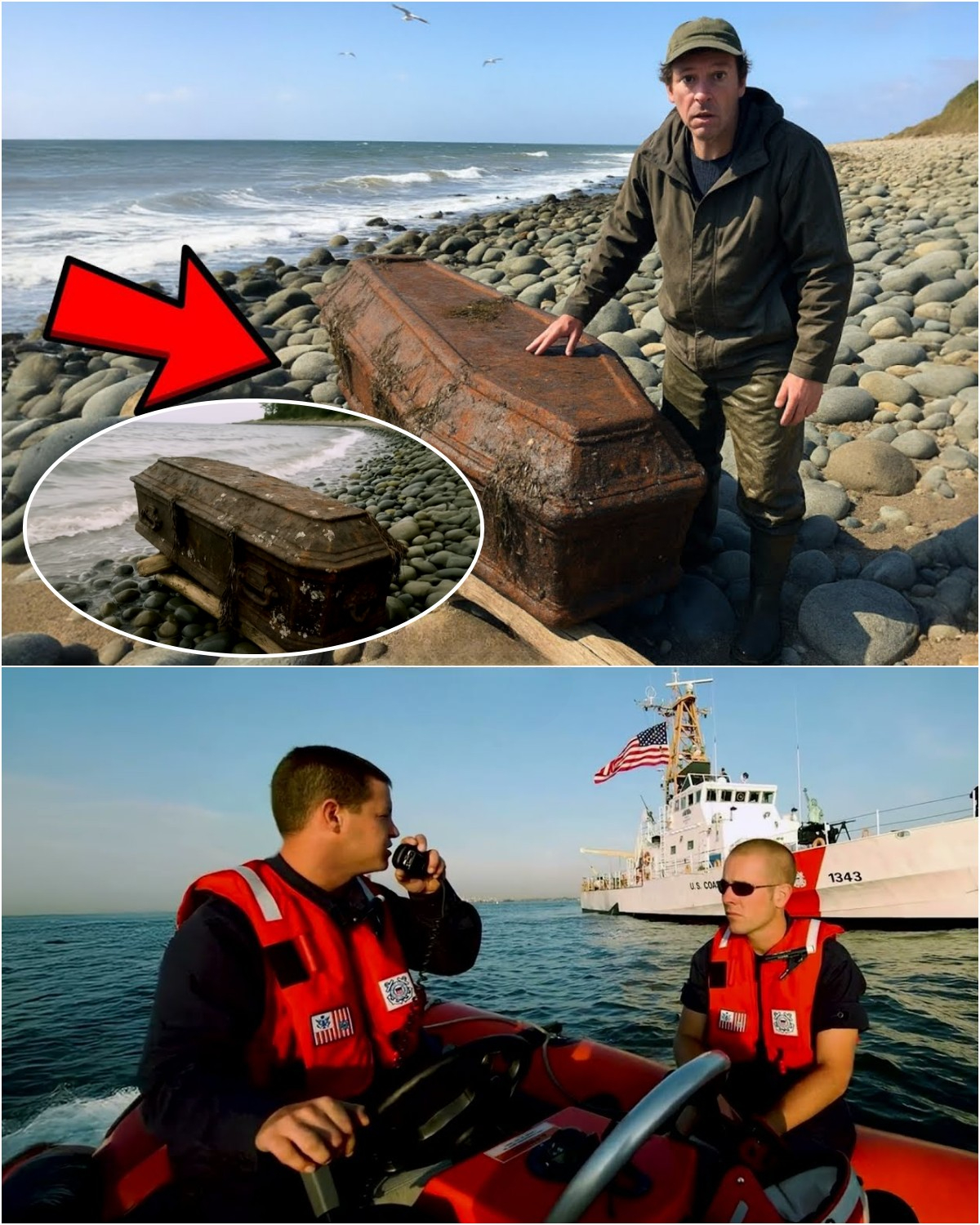For seasoned fisherman Michael Brennan, July 17 began like countless other mornings on the rugged coast of Maine, the salty wind sharp in his face as he guided his weathered skiff through familiar waters to check the lobster traps he had set near a desolate stretch of shoreline, yet this day would soon unfold into one he would never forget, a day when the sea gave up a secret buried for centuries and left him shaken to his core.

Brennan, a respected member of his fishing community with over thirty years on the Atlantic, had seen plenty of oddities carried in by the tides, everything from shattered remnants of shipwrecks to driftwood and even the occasional message in a bottle, but as he steered closer to a rocky outcrop known locally as Dead Man’s Rock, he spotted something so strange it made his pulse quicken: what looked like a massive, barnacle-encrusted box wedged into the jagged shoreline.
At first he thought it was simply another piece of debris, but as his boat edged closer and the shape came into focus, he realized he was staring at a large coffin, weather-beaten and mottled with rust, the kind of artifact that seemed more suited to the pages of a gothic novel than the rocky coast of Maine. The coffin rested precariously on the rocks of the tiny island, a place whispered about by locals because of its treacherous currents and history of wrecks, and though Brennan immediately radioed the coastal patrol to describe his discovery, the temptation to investigate grew stronger with each passing minute, as he wrestled with memories of old seafaring legends about pirate chests, booby traps, and curses meant to punish those too curious for their own good.
The authorities urged him to wait, but his instincts as both a fisherman and a man who had lived his life by the sea told him he couldn’t just leave it, and so he maneuvered closer, prying at the lid with his boat hook, his hands trembling as he wondered whether he was about to expose human remains or awaken something best left alone. With a groan of rusted metal, the coffin lid finally gave way, and Brennan braced himself for horror, but what he found instead drove him to tears, leaving him standing stunned on the rocks with his chest heaving, overwhelmed by the sight inside.
Nestled within the coffin, preserved despite the centuries, were treasures of a bygone age: gold coins stamped with the faces of long-dead monarchs gleamed in the morning light, silver chalices reflected the pale glow of dawn, and ornate jewelry—necklaces, brooches, and rings—lay carefully arranged amid the decayed remnants of a burial shroud, the air heavy with the mingled scents of salt and something older, almost sacred, as though history itself had been locked away until this very moment. By the time the coastal patrol reached the scene, Brennan had stepped back, unable to process the enormity of what he had uncovered, and soon the area was sealed off, with forensic teams and historians arriving to analyze what was quickly recognized as both an archaeological treasure and a historical puzzle.
Experts dated the coffin and its contents to the mid-19th century, a time when some wealthy families still interred their dead with valuables to ease their passage to the afterlife, a practice often lost to shipwrecks or grave robbers, making the survival of such a collection nothing short of miraculous. Dr. Eleanor Graves, a historian of maritime burials, noted that to find a coffin like this intact was extraordinary, offering rare insight into Victorian customs of death, mourning, and the sea.
News of the find spread quickly, drawing attention from collectors, historians, and the curious alike, but for Brennan, the most life-altering moment came when he learned that under maritime law he would receive a finder’s fee, thirty percent of the appraised value of the collection, which experts valued at over two million dollars, meaning Brennan, a man who had scraped together a modest living from the ocean for decades, suddenly faced a future transformed by a sum he had never dreamed of. Though grateful for the fortune, Brennan remained humble, saying he was just glad he had reported it rather than keeping it hidden, but even as his story inspired awe, it left lingering questions about whose remains had been buried with such wealth, how the coffin had been lost to the sea, and what tragedy or shipwreck had consigned it to drift for over a century before it washed ashore.
Local authorities and historians continue to sift through records, searching shipping manifests and family archives for clues, but for Brennan the moment was already etched into memory as a reminder of the ocean’s enduring power to surprise and to change a life in an instant. Along the Maine coast his name is already spoken with reverence, and the story of the coffin that emerged from the sea is on its way to becoming legend, retold in fishing villages and harbors as a tale of fortune, mystery, and the thin line between the known and the unknown, yet for Michael Brennan the true treasure was not just the gold or the fame, but the sense of awe at uncovering a piece of forgotten history, proof that the restless sea still keeps secrets waiting for the right moment to be revealed.





